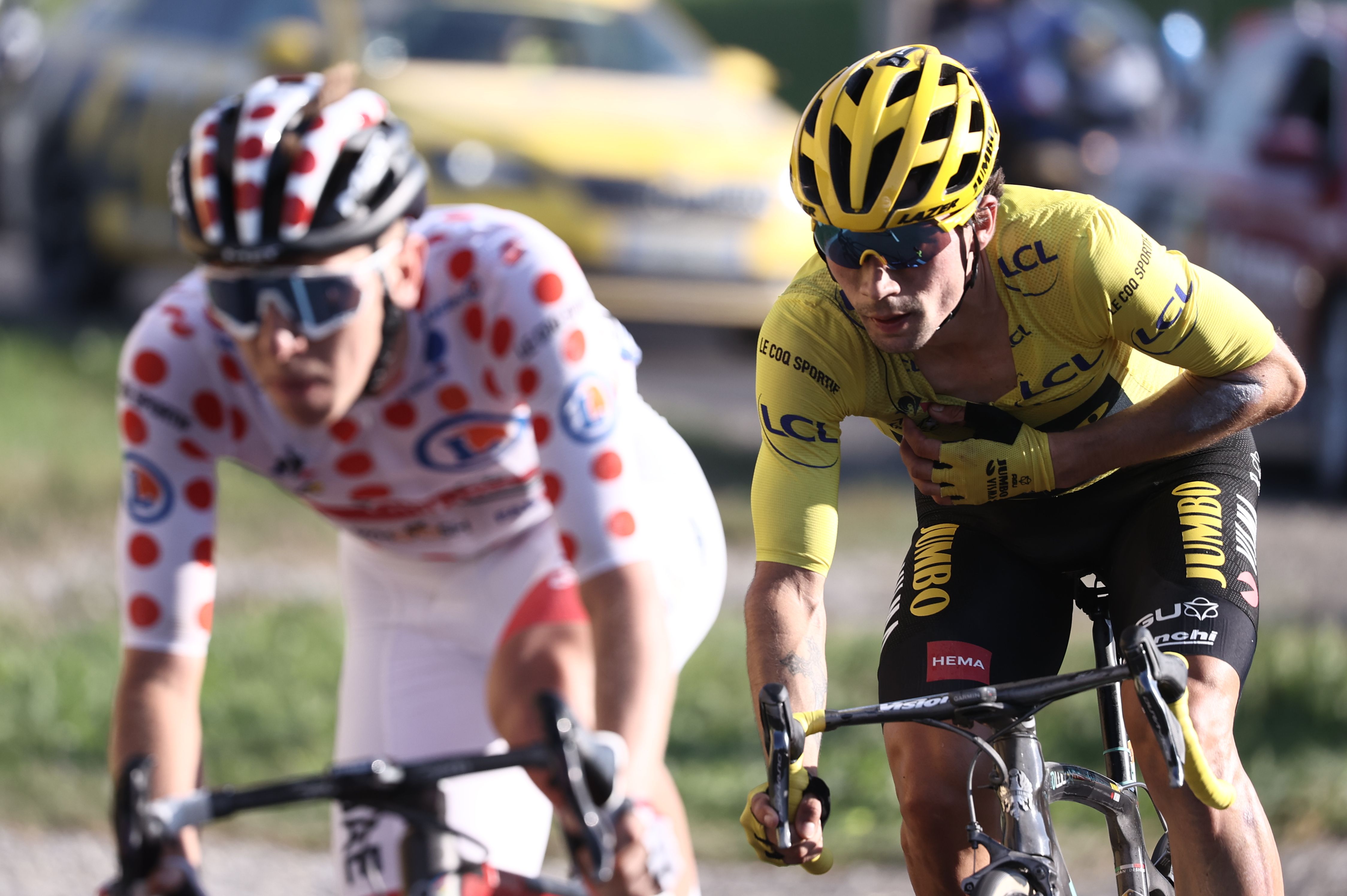Cycling: Primoz Roglic's Tour de France charge puts spotlight on Slovenian athletes
Sign up now: Get the biggest sports news in your inbox

Slovenia's Tadej Pogacar (left) and Primoz Roglic during the 18th stage of the Tour de France on Sept 17, 2020.
PHOTO: AFP
Follow topic:
LJUBLJANA (AFP) - Primoz Roglic and Tadej Pogacar have been making waves for Slovenia as the two leading riders at this year's Tour de France, but they are far from the only athletes from the country to excel.
The duo's dominance of the Grand Boucle and the achievements of a number of their compatriots in other sports has raised the question of how the small, mountainous nation with a population of just two million has achieved so much success.
Top athletes in other disciplines include National Basketball Association (NBA) basketball stars Luka Doncic of the Dallas Mavericks and Goran Dragic of the Miami Heat, Atletico Madrid goalkeeper Jan Oblak and two-time Olympic champion skier Tina Maze.
Ljubljana native Doncic was named in this year's All-NBA First Team on Wednesday (Sept 16) after just his second season in the world's strongest basketball league.
The honour comes after being named Rookie of the Year in 2019.
"There are great professionals in Slovenia in all kinds of sports, it's a tough nation and we are all pushing each other," Roglic, 30, told reporters last week.
According to the country's Olympic committee (OKS), Slovenia also ranks 15th for number of Olympic medals per capita.
Leading Slovenian sports psychologist Matej Tusak, who used to work with Roglic at the beginning of his career, said because the country is small, its coaches are more motivated and work harder to train the nation's smaller pool of talent.
"Slovenians have an ambition to be great... That forces us to take a different path if we want to be successful," he told AFP.
"If you are a basketball coach in the US, even if you do nothing, there are so many players, that from time to time you will get some with talent and athletic capacities that will make a career with just a little of your work."
Tusak said strong state support - inherited from its Communist past when Slovenia was part of Yugoslavia until its disintegration in 1991 - is another reason.
He noted while individual athletes could shine, the country had made little impression in team sports such as football, despite having the likes of Oblak and flamboyant Atalanta forward Josip Ilicic at their disposal.
For success as a football team, Tusak said, "you need to have 40 or 50 great players, which is very hard to find in a nation of two million people".
OKS head Bogdan Gabrovec said the public at large supported top athletes, creating "a positive atmosphere and motivating the young for their work and for new success".
"The system by itself can't produce success, but it is crucial in supporting those achievements," he told AFP.
Andrej Miljkovic, a columnist at leading sports weekly Ekipa24, said young Slovenian athletes' successes are owed, rather than to the system, to the support of their families and close communities as well as their talents and efforts, and a "particular stubbornness and persistence".
"It's a total marvel," Miljkovic told AFP, referring to the large number of athletes that have succeeded in different sports in recent years.
Roglic himself personifies that toughness.
He became a professional cyclist after a crash forced him to end his successful career as a junior ski jumper in 2007.
Tusak believes the switch to cycling - a sport that is less technical but requires more endurance - suited Roglic's characteristics as an "extremely disciplined, self-motivated sportsman".
Meanwhile, doping scandals have not left Slovenia untouched.
German doctor Mark Schmidt, accused of masterminding an international blood-doping network, went on trial in his home country on Wednesday.
So far, 23 cyclists and skiers from eight countries are known to be involved, but more names could emerge.
What is more, Slovenia's Milan Erzen, a former cyclist and now manager, is suspected of having done business with Schmidt.
Several riders in Slovenia were suspended in 2019 because of their involvement in doping.
Tusak admitted there was "always a risk" of doping, but to dismiss impressive results from Slovenian athletes as being owed to that would be "ridiculous".
Tusak said top sports physician Radoje Milic had spotted "exceptional... oxygen transmission" in Roglic when he tested him in 2012, and later found the same trait in Pogacar, now 21.
He added that Milic told the Adria Mobil team where Roglic began his professional career in 2013: "Look, we have a man that has just started training and has the kind of results nobody has had before. Take him to your team".
Tusak predicted Roglic still has four or five years of successful cycling ahead of him.
Miljkovic said he would not rule out a Pogacar victory at the Tour.
"This is a 21-year-old rider that on an individual level is already Roglic's rival," Miljkovic said.

